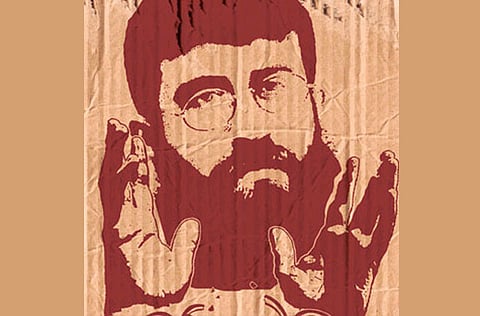Adnan driven by higher logic
My husband has helped expose the plight of Palestinians held under administrative detention by Israel

The name of my husband, Khader Adnan, has now become known across the world. Four months ago he was unknown outside our homeland, Palestine. His hunger strike of 66 days has transformed him into a global figure and a symbol of my people's struggle.
Our life was turned upside down on December 17, 2011 when Israeli troops raided our home in Araba, south of Jenin, in the West Bank. The havoc they wreaked will always remain etched on the minds of our two daughters, Ma'ali, aged four, and Baysan, one-and-a-half years old.
Adnan has been an activist for many years. He is no shadowy figure but an outspoken local leader against the Israeli occupation. He is well known to both the Israeli occupation authorities and the Palestinian National Authority in Ramallah. Both have detained him for various periods without charge. Not for the first time, Adnan has used hunger strike, his powerful form of peaceful protest, to great effect.
What drives my husband to pursue this dangerous and difficult form of resistance? I have no doubt it is the unjust nature of ‘administrative detention' and its notorious methods of torture and humiliation. From the moment he was bundled into their military vehicle in December, insults and veiled threats were thrown at him.
Adnan was never motivated by personal hurt or inconvenience. He, like thousands of other Palestinians, is determined to see an end to the occupation. He is driven by a higher logic: to expose to the world the plight of imprisoned Palestinians. Since 1967 more than 650,000 Palestinians have passed through Israeli jails — many of them in administrative detention — an average of one in four in the Occupied Territories. Administrative detention is a nebulous and vindictive measure used by the occupation. It is one of the cruel legacies of the old British mandate in Palestine.
Today, in the absence of condemnation from the international community, Israel uses it with increasing frequency against university students and lecturers, young professionals and even elected parliamentarians. Some 300 are being held. It is part of an immoral policy used to keep Palestinians in a state of perpetual poverty and underdevelopment.
Illegal scheme
When a military commander issues an order for administrative detention, no evidence is produced. No charges are brought against the victims, and the occupation has no obligation to give reasons for the detention. The prisoners' problem is so prevalent today that Palestinians have had to create a special ministry for prisoners' affairs.
The occupation has decided, under pressure, to free my husband in April, but hundreds more will continue to languish in putrid cells under the same illegal scheme. Adnan has, however, delivered his message: that this long night of tyranny and inhumanity will come to an end.
We are well aware that the Israelis may try to renege on last week's agreement — as they have done with the recent prisoner exchange deal — by re-arresting the freed prisoners. But for every occasion there will be a response, and I have no doubt my husband would not hesitate to resume his stoic struggle with even more strength and determination.
For me, the most difficult part of this ordeal has been the knowledge that at any time I could receive a phone call announcing that my husband is dead. But this is the price for our freedom. It is the indispensable sacrifice needed so that our children might enjoy a life of freedom and dignity.
To the free world, the millions who heard of Adnan and supported him by calling for his release, I extend our heartfelt thanks and appreciation.
Randa Musa is the wife of Palestinian hunger striker and Islamic Jihad activist Khader Adnan.



